

"
According to Medicinenets.com, stress is a normal part of our life which enables us to be strong or weak depend on circumstances. Coping and managing stress is important as uncheck stress could cause a lasting effects on one mentally.
Stress_1 noun. Mental pressure physical pressure [uncountable, countable] physical pressure put on something that can damage it or make it lose its shape stress on something When you have an injury you start putting stress on other parts of your body.Little is known about the effects of water stress on plants.The building was condemned because of the damage caused by excessive heat stress.
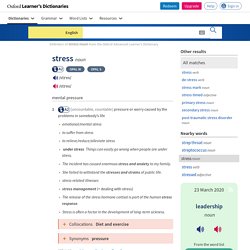
On word/syllable. Definition of stress by Medical dictionary. Definition Stress is defined as an organism's total response to environmental demands or pressures.

When stress was first studied in the 1950s, the term was used to denote both the causes and the experienced effects of these pressures. More recently, however, the word stressor has been used for the stimulus that provokes a stress response. One recurrent disagreement among researchers concerns the definition of stress in humans. The Journal of Clinical Endocrinology & Metabolism. We use cookies to enhance your experience on our website.By continuing to use our website, you are agreeing to our use of cookies.
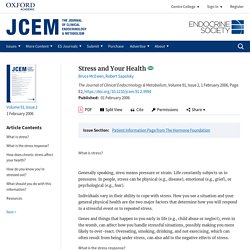
You can change your cookie settings at any time. <a href=" Find out more</a> Skip to Main Content Search Close. Stress symptoms: Effects on your body and behavior. Stress symptoms may be affecting your health, even though you might not realize it.
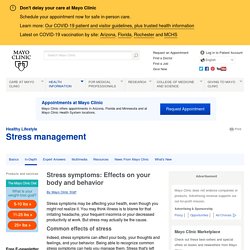
You may think illness is to blame for that irritating headache, your frequent insomnia or your decreased productivity at work. But stress may actually be the cause. Stress at the workplace. Brunpres0307. Workplace Stress - The American Institute of Stress. Although the Institute is often asked to construct lists of the “most” and “least” stressful occupations, such rankings have little importance for several reasons.
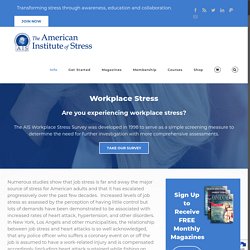
It is not the job but the person-environment fit that matters. Some individuals thrive in the time urgent pressure cooker of life in the fast lane, having to perform several duties at the same time and a list of things to do that would overwhelm most of us — provided they perceive that they are in control. They would be severely stressed by dull, dead-end assembly line work enjoyed by others who shun responsibility and simply want to perform a task that is well within their capabilities. The stresses that a policeman or high school teacher working in an inner city environment are subjected to are quite different than those experienced by their counterparts in rural Iowa. Stress is a highly personalized phenomenon and can vary widely even in identical situations for different reasons. Stress: Why does it happen and how can we manage it? Stress is a natural feeling of not being able to cope with specific demands and events.
However, stress can become a chronic condition if a person does not take steps to manage it. These demands can come from work, relationships, financial pressures, and other situations, but anything that poses a real or perceived challenge or threat to a person’s well-being can cause stress. Stress can be a motivator, and it can even be essential to survival.
The body’s fight-or-flight mechanism tells a person when and how to respond to danger. However, when the body becomes triggered too easily, or there are too many stressors at one time, it can undermine a person’s mental and physical health and become harmful. Stress is the body’s natural defense against predators and danger. When humans face a challenge or threat, they have a partly physical response. The body produces larger quantities of the chemicals cortisol, epinephrine, and norepinephrine. Stress: Signs, Symptoms, Management & Prevention. What is stress?
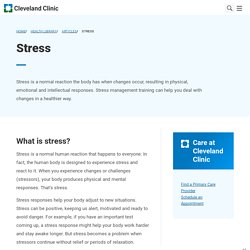
Stress is the body's reaction to any change that requires an adjustment or response. The body reacts to these changes with physical, mental, and emotional responses. Stress: Symptoms, Causes, and Stress Management. Conclusions about the effects of stress Uncontrollable, unpredictable, and constant stress has far-reaching consequences on our physical and mental health.
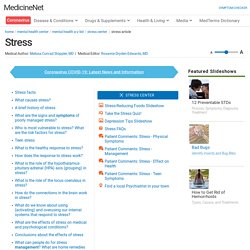
Stress can begin in the womb and recur throughout life. One of the potential pathological (abnormal) consequences of stress is a learned helplessness that leads to the hopelessness and helplessness of clinical depression, but in addition, many illnesses, such as chronic anxiety states, high blood pressure, heart disease, and addictive disorders, to name a few, also seem to be influenced by chronic or overwhelming stress. Nature, however, has provided us with efficient processes (mechanisms) to cope with stressors through the HPA axis and the locus coeruleus/sympathetic nervous system. Coping with stress at work. Everyone who has ever held a job has, at some point, felt the pressure of work-related stress.
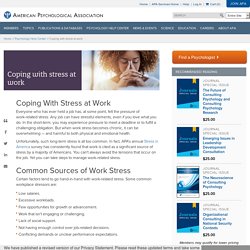
Any job can have stressful elements, even if you love what you do. In the short-term, you may experience pressure to meet a deadline or to fulfill a challenging obligation.